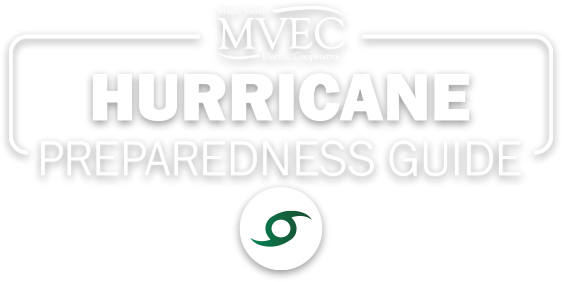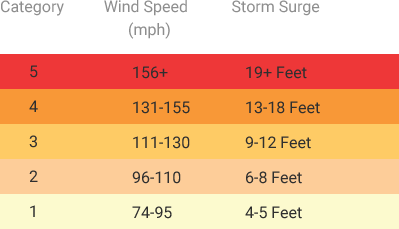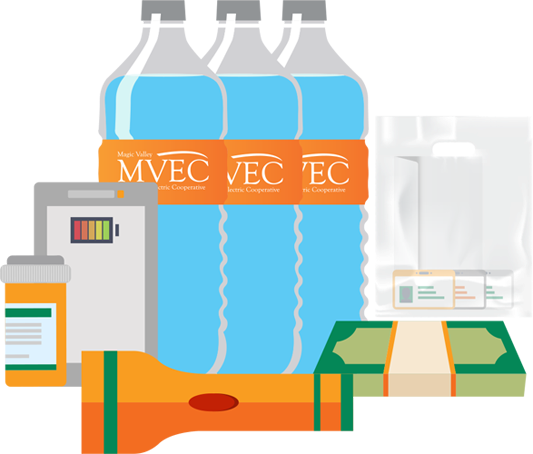Hurricane Guide
June 1 marks the opening day of hurricane
season, MVEC wants to remind you to take
precautions. Here are tips you and your
family should practice to stay safe before,
during and after the storm.
June 1 marks the opening day of hurricane
season, MVEC wants to remind you to take
precautions. Here are tips you and your
family should practice to stay safe before,
during and after the storm.

Terms to know.
![]()
Tropical storm conditions are
possible and may affect your
area within the next 48 hours.
![]()
Tropical storm conditions are
expected in your area within
the next 36 hours.
![]()
This is the clear center of the
storm that arrives with calmer
conditions. But remember, an eye
passing over you signals that
the storm is only half over.
![]()
Bands coming off the cyclone
that produce severe weather
conditions, such as heavy rain,
wind and tornadoes.
![]()
Hurricane conditions are
possible in the area. Watches
are issued up to 48 hours in
advance of the anticipated
storm-force winds.
![]()
Hurricane conditions are
expected in the area.
Warnings are issued up
to 36 hours in advance
of the storm.
![]()
The area surrounding the
eye contains some of the
most severe weather of
the storm, with the highest
wind speed and heaviest
precipitation.
![]()
A deadly rush of ocean of
Gulf water that occurs when
a storm makes landfall. This
often floods coastal areas
and sometimes areas further
inland.
After an outage.
Transmission towers and cables that supply power to transmission substations (and thousands of members) rarely fail, but when damaged, these facilities must be repaired before other parts of the system can operate.
A substation can serve hundreds or thousands of consumers. When a major outage occurs, line crews inspect substation to determine if problems stem from transmission lines feeding into the substation, the substation itself or if problems exist further down the line.
If the problems cannot be isolated at a distribution substation, distribution lines are checked. These lines carry power to large groups of consumers in communities or housing developments.
If local outages persist, supply lines (also known as tap lines) are inspected. These lines deliver power to transformers, either mounted on poles or placed on pads for underground service, outside businesses, schools and homes.
If your home remains without power, the service lines between a transformer and your residence may need to be repaired. Always call to report an outage to help line crews isolate local issue.

Checklist.
![]()
One gallon of CLEAN DRINKING WATER per individual (and pets) for 3-7 days. Fill bathtubs with water for cleaning. Save used soapy water to flush toilets.
![]()
NON-PERISHABLE FOOD to last 3-7 days for individuals and pets.
![]()
FIRST AID KIT plus a 3-7 day supply of any prescription medications.
![]()
BATTERY-POWERED WEATHER RADIO and extra batteries.
![]()
FULL GAS TANKS in your vehicles.

CHARGE electric vehicles.
A go bag.
Situations change. Prepare A GO BAG for each individual with you. Each Go Bag should be light and portable, carry an ID tag, and at least contain:
Your GO BAG bag should also contain important family documents (insurance, medical records, bank account numbers, social security card, pet care information) inside a watertight resealable plastic bag or container.

Monitor weather reports about the oncoming hurricane threat. You should consider evacuating/leaving the area:
Here’s a list of resources available to assist you during a major storm.
Keep the following contacts handy in case of an emergency.
Website: nhc.noaa.gov
Website: fema.gov
Phone: 800-621-3362
Website: redcross.org
Phone: (956) 423-0523
Toll Free: (800) 785-7851
Website: ready.gov
Phone: 1-800-FED-INFO
Website: 211texas.org
Phone: 211
Phone: 1-866-225-5683
Website: magicvalley.coop
In an emergency, be sure to call 911 for assistance.